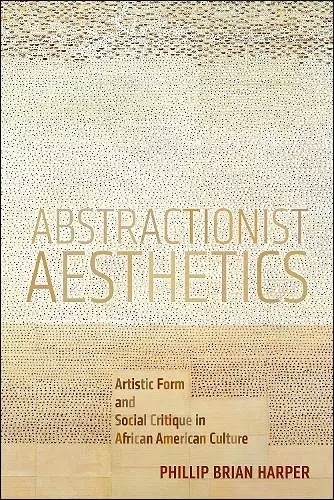Abstractionist Aesthetics
Artistic Form and Social Critique in African American Culture
Format:Paperback
Publisher:New York University Press
Published:25th Dec '15
Currently unavailable, and unfortunately no date known when it will be back
This paperback is available in another edition too:
- Hardback£74.00(9781479865437)

This work presents a critical examination of African American culture, advocating for aesthetic abstractionism over realism. It highlights the transformative potential of abstraction in representing Black identities and experiences.
Abstractionist Aesthetics by Phillip Brian Harper presents a thought-provoking exploration of African American expressive culture, challenging traditional depictions of black identity. Harper argues for the importance of African American aesthetic abstractionism, a mode of representation that emphasizes the artificiality of art rather than striving for realistic portrayals. He suggests that realism often reinforces the very social constructs it seeks to critique, while abstractionism reveals the constructed nature of these realities, inviting critical examination and potential transformation.
In this work, Harper contends that the focus on positive representations limits the scope of African American cultural expression. By displacing realism as the dominant aesthetic approach, he repositions literature as a vital arena for African American cultural discourse and elevates experimental prose as a significant form within the literary landscape. Through this lens, Harper encourages a reevaluation of how racial identities are understood and represented in various artistic mediums.
Drawing on a diverse range of artistic examples, including the works of visual artists like Fred Wilson and Kara Walker, musicians such as Billie Holiday and Cecil Taylor, and writers including Ntozake Shange, Alice Walker, and John Keene, the book raises critical questions about the social meanings attached to blackness. Ultimately, Abstractionist Aesthetics aims to redefine African American aesthetics, positioning abstractionism as a powerful tool for representation and cultural critique.
[C]ompelling. It shows how art can be a powerful instrument for reflecting how a social identity can be made to assume a certain social meaning and how it can be used to question the identity in this way making it malleable to transformation. Anyone interested in identity representation and culture, particularly of an ethnic or racial nature, will find much to inform and challenge them in Harpers tightly argued and well-referenced book. * Ethnic and Racial Studies *
Opens up possibilities for revising our notions of representation.Abstractionist Aestheticsis a valuable contribution to ongoing conversations about race, politics, and aesthetics. * ASAP/Journal *
A riveting polemic on the politics of abstraction in black art. Moving among examples in a range of medialiterature, music, visual art, and filmwith fine-tuned readings,Abstractionist Aestheticsis a devastating critique of the all-too-common presumption that variants of realism are the only effective option for a black art that would respond to the history of racial deprivation. -- Brent Hayes Edwards,author of The Practice of Diaspora: Literature,Translation, and the Rise of Black Internationalis
Beautifully argued with unexpected twists and turns, Phillip Brian Harper exposes how our prefabricated notions of the sounds, sights, and feeling of blackness dictate our often parochial reactions to artistic efforts to engage and broaden the places assigned to black Americans. A momentous and magnificent book. -- Michael Awkward, Gayl Jones Professor of Afro-American Literature and Culture, University of Michigan
ISBN: 9781479818365
Dimensions: unknown
Weight: 476g
256 pages